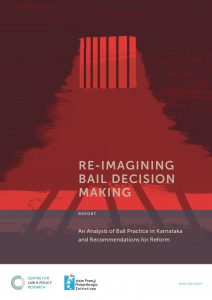
The Centre for Law and Policy Research’s empirical study titled ‘Re-imagining Bail Decision Making’ looks at bail decision making in trial courts in three districts in Karnataka – Bengaluru, Dharwad and Tumakuru. It documents the outcomes on the first production of an accused before the court and evaluates the influence of different factors on a decision on whether bail is granted or not. We adopted two methods of data collection for the study: (a) Through court observations of ‘first production’ of accused persons, over a period of 45 days to examine if a majority of arrested persons were detained at this stage and (b) Examining court records of cases in the pre-trial stage, over a period of 6 months for a broader review of bail decision making in the pre-trial stage. At each stage, we studied the influence of certain identified substantive and procedural factors on bail decisions.
The research focuses on the courts, which are the primary site at which decisions on granting bail are made, to understand what guides the grant or non-grant of bail and what are the factors that decide whether bail is likely to be granted or not. These include the statutory basis for the offence, the nature of the offence, its classification as bailable or non-bailable, the punishment prescribed and effective legal representation by lawyers.
